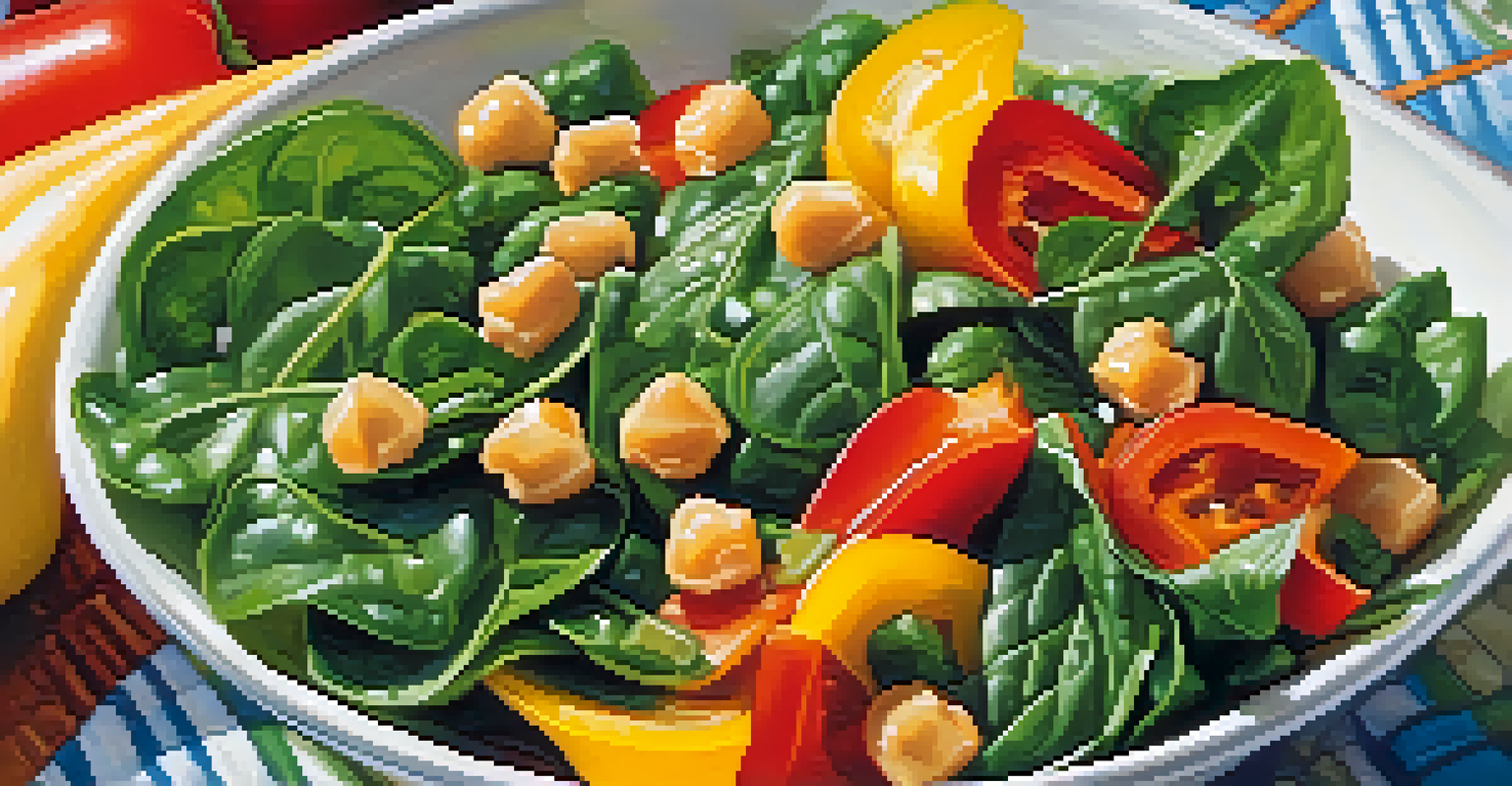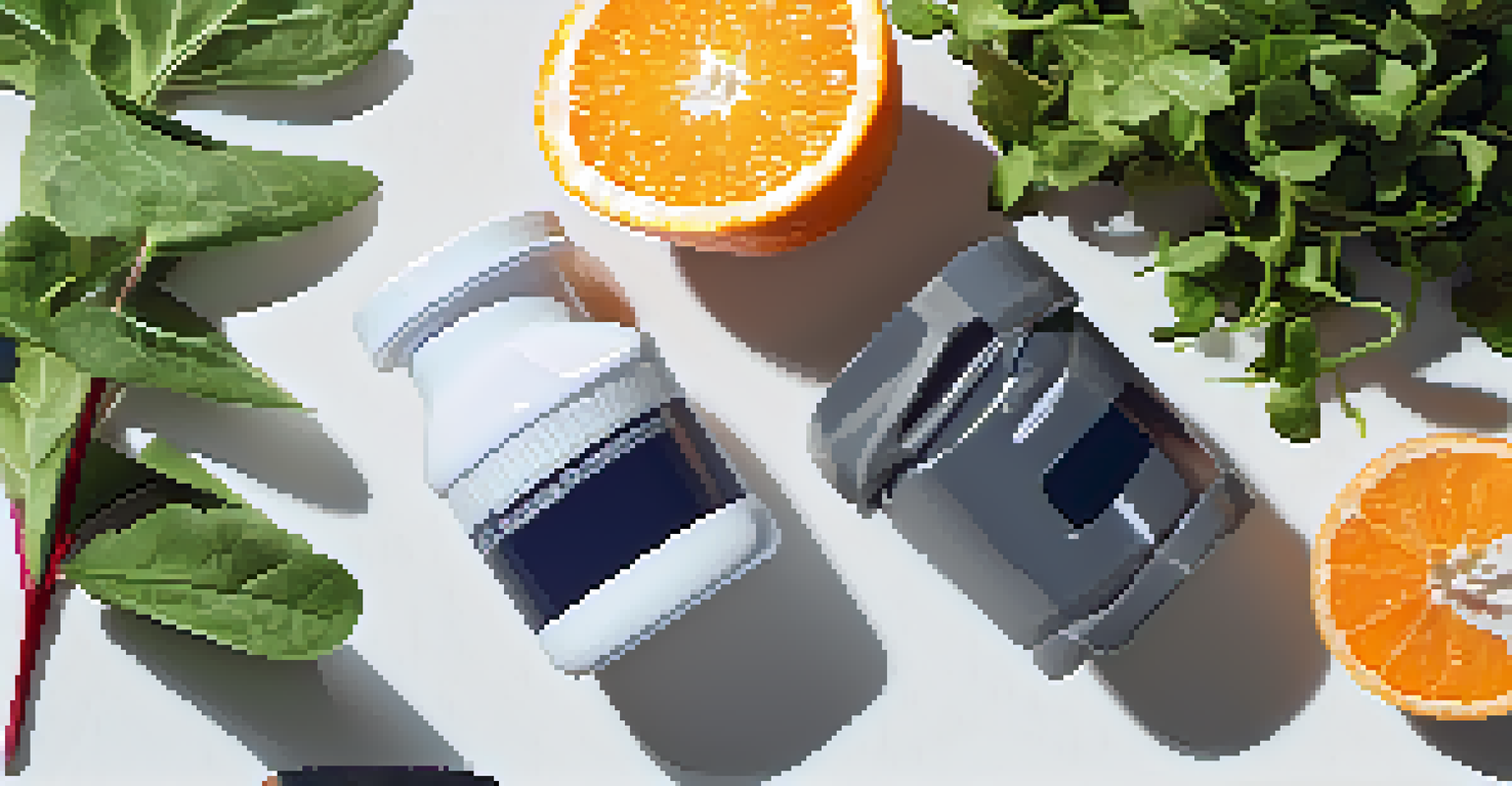Iron-Rich Supplements for Vegetarians: What You Need to Know

Understanding Iron: Why It's Crucial for Your Health
Iron plays a vital role in our bodies, primarily in the formation of hemoglobin. This protein in red blood cells carries oxygen from our lungs to the rest of our body. Without adequate iron, you may experience fatigue, weakness, and even cognitive impairments.
Iron is the most essential nutrient for life, and without it, we can't function properly.
For vegetarians, the challenge is that the body absorbs iron from plant sources less efficiently than from meat. This can lead to a higher risk of iron deficiency, especially if dietary intake isn't carefully planned. It’s essential to understand your iron needs, particularly if you follow a vegetarian or vegan diet.
Incorporating iron-rich foods and considering supplements can help prevent deficiencies. Understanding the different types of iron—heme and non-heme—can aid in making informed dietary choices that support your health.
Types of Iron Supplements: An Overview
There are two primary types of iron supplements: ferrous and ferric. Ferrous supplements, such as ferrous sulfate, are more easily absorbed by the body, making them a popular choice for those needing to increase their iron levels quickly. Ferric iron, while less absorbable, may be found in some fortified foods.

Other forms of iron supplements include heme iron, which is derived from animal sources, and non-heme iron, which comes from plant sources. For vegetarians, non-heme iron supplements are the most suitable, although they may require higher doses to achieve the same effect as heme iron.
Importance of Iron for Health
Iron is crucial for forming hemoglobin, which carries oxygen in the blood, and its deficiency can lead to fatigue and cognitive issues.
It's important to consult with a healthcare professional before selecting an iron supplement, as they can help determine the best type and dosage for your specific needs.
Signs of Iron Deficiency: What to Look For
Iron deficiency can manifest in various ways, and recognizing the signs early can help you address the problem before it worsens. Common symptoms include fatigue, pale skin, shortness of breath, and dizziness. If you find yourself feeling unusually tired or weak, it could be a sign that your iron levels are low.
A balanced diet is the key to maintaining your health; iron is a crucial part of that balance.
In addition to physical symptoms, you might also experience cognitive difficulties, such as trouble concentrating or memory issues. These can significantly impact daily life, making it crucial to be aware of your iron intake.
If you suspect you have an iron deficiency, consider speaking with a healthcare provider. They can perform tests and help you create a plan to increase your iron levels through diet and supplements.
Best Plant-Based Sources of Iron for Vegetarians
When looking to boost your iron intake, there are plenty of plant-based foods that are rich in non-heme iron. Foods such as lentils, chickpeas, quinoa, tofu, and dark leafy greens like spinach and kale are excellent sources. Incorporating these into your meals can help ensure you're meeting your iron needs.
Pairing these iron-rich foods with vitamin C sources, like citrus fruits or bell peppers, can enhance the absorption of non-heme iron. For example, adding lemon juice to your spinach salad not only adds flavor but also increases iron absorption.
Choosing the Right Iron Supplement
Ferrous supplements are generally more absorbable than ferric ones, making them a better choice for those needing to boost iron levels quickly.
Experimenting with different recipes that include these ingredients can make it both enjoyable and effective to increase your iron intake.
The Role of Vitamin C in Iron Absorption
Vitamin C is not just beneficial for your immune system; it also plays an essential role in iron absorption. When consumed alongside iron-rich foods or supplements, vitamin C can significantly enhance the body's ability to absorb non-heme iron. This is particularly important for vegetarians, who primarily rely on plant sources of iron.
Incorporating vitamin C-rich foods like oranges, strawberries, and bell peppers into your meals can help maximize your iron intake. For instance, adding a side of fruit or a sprinkle of fresh herbs to a bean dish can provide that necessary boost.
Making a habit of combining iron and vitamin C sources can ensure you're getting the most out of your diet, making it easier to meet your nutritional needs.
Potential Side Effects of Iron Supplements
While iron supplements can be beneficial, they can also come with side effects. Common issues include gastrointestinal discomfort, constipation, and nausea. If you experience any of these symptoms, it may be worth discussing your dosage or the type of supplement with your healthcare provider.
Taking iron supplements on an empty stomach may improve absorption but can increase the likelihood of side effects. Conversely, taking them with food can reduce discomfort but may hinder absorption. Finding a balance that works for you is essential.
Enhancing Iron Absorption with Vitamin C
Vitamin C significantly improves the absorption of non-heme iron from plant sources, making it essential for those relying on vegetarian diets.
Monitoring your body’s response to iron supplements is crucial. If side effects persist, it’s important to consult your healthcare provider for guidance on how to proceed.
Consulting a Healthcare Professional: Your Best Bet
Before starting any iron supplement, it’s wise to consult with a healthcare professional. They can help determine your iron levels through blood tests and recommend the best course of action tailored to your dietary preferences and health needs. This personalized approach can help prevent potential issues associated with self-diagnosing.
A healthcare provider can also assist with creating a balanced meal plan that meets your iron requirements. They can guide you on the right types of foods and supplements to include, taking into account your overall health and any existing conditions.

Ultimately, working together with a professional can ensure you're on the right path to maintaining optimal iron levels while enjoying a vegetarian lifestyle.